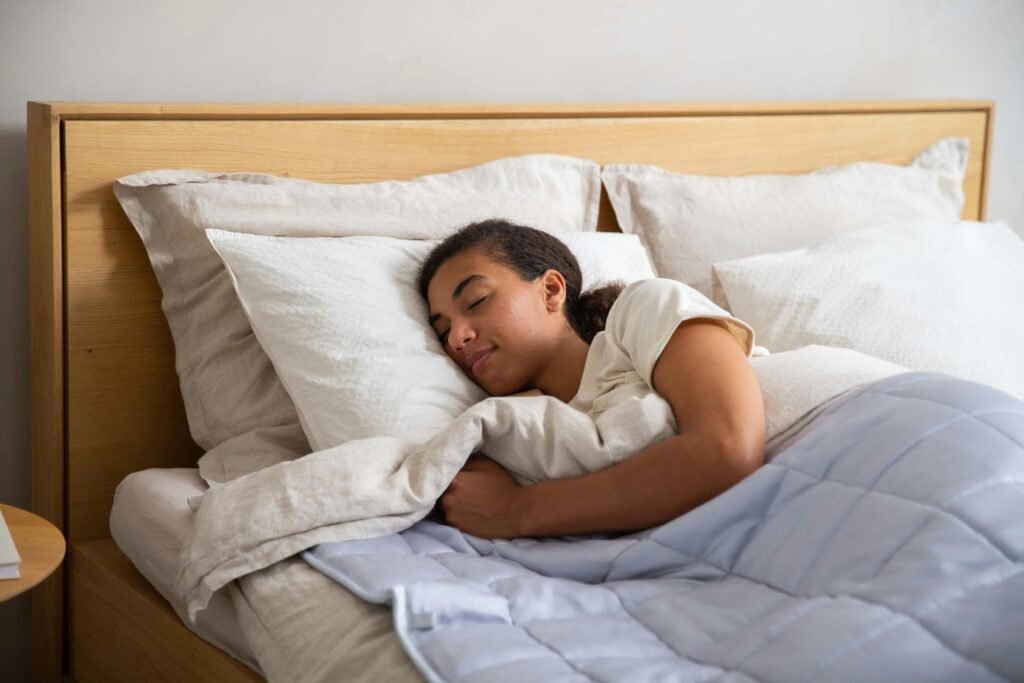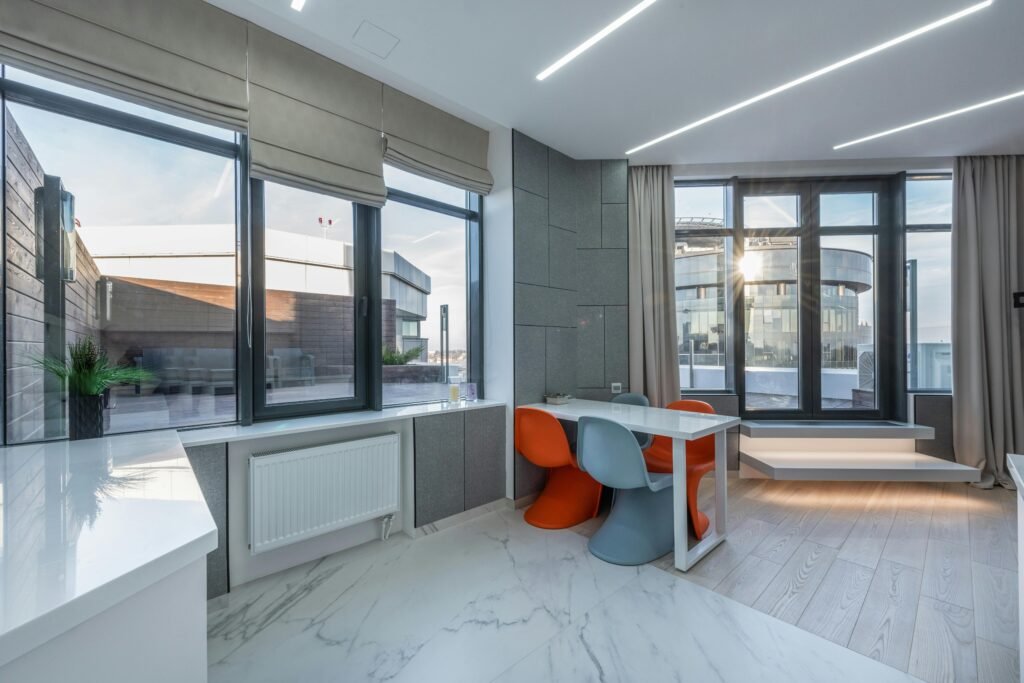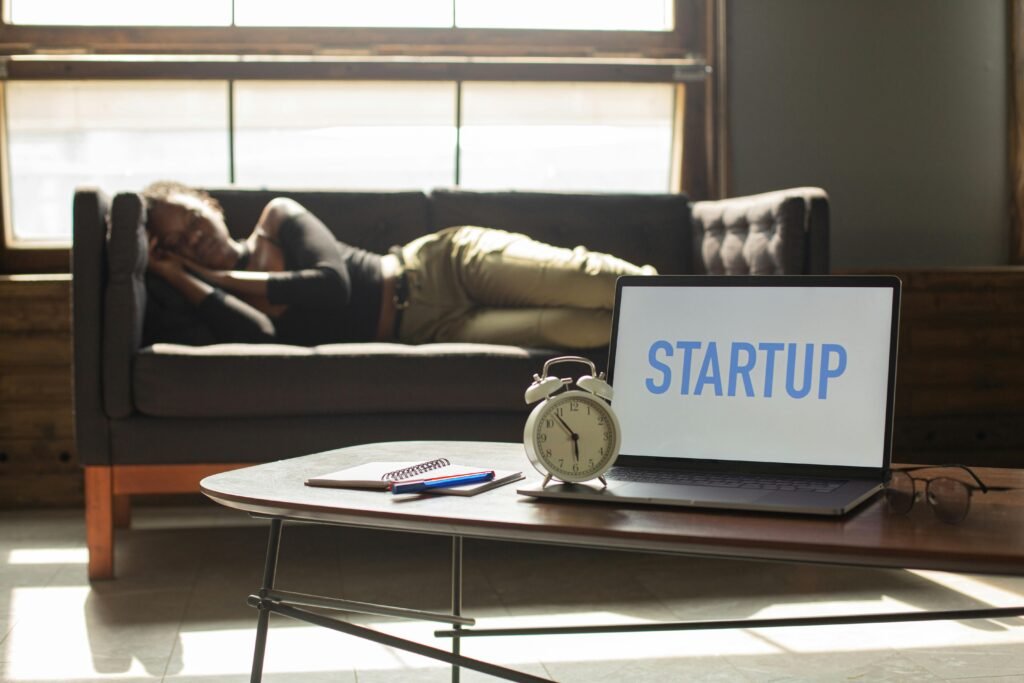“Deep, Restful Sleep” Did you know that around 30% of Americans don’t get enough sleep?1 Insomnia, or trouble sleeping, affects up to 15% of adults. Its risk is higher for women and older adults.1 Surprisingly, 43% of Americans blame stress for keeping them awake at night once a month.1 If you’re not getting the sleep you need, mindfulness might be just what you’re looking for. Studies show it’s as good as other top treatments for insomnia.1
This guide will take you through 15 tips based on mindfulness for better sleep. We’ll cover setting up your bedroom right and using relaxation methods. These tips can really change your sleep and make you feel better overall.
Importance of Sleep for Overall Health

Getting enough good quality sleep is key to staying healthy.2 It’s recommended that school-age kids sleep nine hours. Teens should sleep between eight and 10 hours.2 But, most adults only need about seven hours to be at their best.3 If an adult sleeps over nine hours but feels tired, there might be a health issue.2
Effects of Poor Sleep on Physical and Mental Well-being
Poor sleep hurts our thinking, mood, and even our heart and immune systems.2 It can up the odds of getting fat or diabetes too.2 Lack of sleep makes us want to eat more, keeps in extra salt, and raises inflammation, which can lead to being overweight.4 Those who sleep less than seven hours tend to be heavier and risk obesity more than better sleepers.4 A lack of sleep also boosts the risk of becoming depressed. It can mess with our thoughts, making us more prone to feeling down.4
Benefits of Adequate Sleep
Getting the right amount of sleep helps our bodies and minds a lot. Studies show a link between bad sleep and gaining weight. But, fixing our sleep can help lose weight and avoid obesity.4 Adding 1.2 hours of sleep a night made overweight people eat less by 270 calories a day. This points to how sleep is crucial for managing our weight.4 Not having a regular sleep schedule can mess up the way our body fights inflammation.4
Deep sleep is very important for our bodies. It’s when we repair tissues, boost our immunity, and stay fit.4
Increase Bright Light Exposure During the Day

It’s important to get light from the sun during the day. This helps your body regulate its sleep and wake times.5 Being in sunlight or bright light helps keep your body’s clock in check. This makes you more energized during the day and sleep better at night.5
Regulating Circadian Rhythm with Sunlight
Our body’s clock is deeply tied to the sun.6 Sunlight, which can be really bright, affects when we sleep and wake up.6 So, catching some rays during the day can make sure you sleep well at night.
Benefits of Bright Light Therapy
Bright light therapy doesn’t just regulate your sleep.5 A study from 2022 found it can make you sleep better and longer.5 It’s especially good for those who can’t be outside much because of their job.6 About 16% of U.S. workers work in the evenings or nights. So, they could really benefit from this therapy.6
You May Also Like:
Find Your Perfect Wellness Solutions for a Balanced Life 2024
Reduce Blue Light Exposure in the Evening
Light at night affects you differently than during the day. It can lower hormone levels, like melatonin. Melatonin helps us relax and sleep deeply.7 Most Americans use screens an hour before sleep, which can harm sleep quality.7 Blue light before bed especially messes with our sleep by stopping melatonin. This hormone makes us feel sleepy.7
Impact of Blue Light on Melatonin Production
Too much blue light messes up your body’s internal clock. This can cause health issues and even affect mental health.7 It makes the brain feel awake, increasing body temperature and heart rate.7 Spending a lot of time with blue lights, like two hours at night, can make it hard to fall asleep.8 This light also stops the body from making melatonin at night, which might mess with how cancer treatment works.8
Strategies to Minimize Blue Light Exposure
Wearing special glasses can help. They block melatonin-harming bright lights.7 To stop blue light’s bad effects, you can lower your use of LED and fluorescent lights and stop using screens after sunset. This will lessen your nighttime blue light.7 Best way to avoid blue light before bed is to turn it off 2 to 3 hours before sleep.7 Fluorescent lights, LEDs, smartphones, TVs, computers, tablets, e-Readers, and gaming consoles give off a lot of blue light.7
To cut down on blue light, make it a habit to avoid screens before sleep. Light your room with red or orange lamps and lower your screen brightness.7 Use apps that reduce blue light. You can also wear sleep masks.7 Products like glasses and special bulbs can shield your eyes from blue light.8 These glasses come in types for daytime, with clear or yellow lenses, and for nighttime with amber or red lenses. Each type offers different levels of protection.8 For the best safety, switch to amber or red light bulbs in your home and wear these glasses when looking at screens.8
Avoid Caffeine Late in the Day
Caffeine is a common stimulant that can boost focus, energy, and sports performance.9 When you have it is key for good sleep. A 2023 study showed drinking caffeine late can reduce your sleep by 45 minutes and the quality of your sleep by 7%.9
Effects of Caffeine on Sleep Quality
Caffeine stops adenosine, a chemical that makes you sleepy, from working. This is helpful during the day. However, if you drink it too close to bedtime, it can mess up your sleep schedule and make sleeping hard.1011 Caffeine’s effects last a long time, sometimes from 2 to 12 hours, depending on the person.10
Recommended Cutoff Time for Caffeine Consumption
To prevent caffeine from keeping you up, stop drinking it at least 8 hours before you plan to sleep.10 This way, your body has enough time to process the caffeine. This can help keep your sleep on track. If you have caffeine six hours before bed, you might lose 1 hour of sleep.11 People who are extra sensitive to caffeine might need to stop even earlier.
A cup of coffee can have 100-200 milligrams of caffeine. But, energy drinks can have 50-300 milligrams in a similar amount.1011 It’s wise to think about your caffeine intake, especially in the afternoon. Doing so can help you enjoy the deep, restful sleep your body craves.
Limit Irregular or Long Daytime Naps

While short power naps help with napping and sleep quality, too much nap time can mess up your night’s sleep.12
How Napping Affects Nighttime Sleep
Mayo Clinic says, aim for naps of 10 to 20 minutes. This boosts wakefulness but avoids post-nap tiredness.12
Lengthier naps, like those that hit 30 minutes, might leave you feeling cloudy.12 But, napping for an hour or more can throw off your body clock. You’ll likely wake up feeling out of sorts.12
Those battling insomnia should skip naps. Naps for them can lead to sleeping at strange times and feeling restless.12
Guidelines for Healthy Napping
The sweet spot for nap length for adults is between 20 and 30 minutes. This keeps you alert without falling into a deep sleep.13
Those in intense jobs may find 90-minute naps helpful.13 These are good for emergency workers.13
For the best results, nap at least eight hours before bedtime. Before 3 p.m. is the perfect time, say sleep pros.13 Create a cozy nap space that’s dark, quiet, and cool. This can help you sleep better.13
Maintain Consistent Sleep and Wake Times
Your body follows a natural clock, matching the sun’s pattern.5 When you sleep and wake up at regular times, your body gets used to it. This helps you sleep better. It also keeps your inner clock working right, leading to quality sleep.
Importance of Circadian Rhythm Regulation
Our body’s rhythm, the 24-hour clock, affects sleep, hormones, and digestion.14 If it’s off, sleep problems happen. But, sticking to a sleep routine helps your body clock stay steady, improving your sleep and health.
Tips for Establishing a Consistent Sleep Schedule
Sleep experts say to go to bed and get up at the same times every day, weekdays and weekends.15 Doing this tells your body when it’s sleep time. It’s also bad for your rhythm to stay up late or sleep in.
A calming bedtime routine can also signal your body to relax. Maybe try a warm bath or meditation. This tells your body it’s time to rest. Deep, Restful Sleep
Focusing on regular sleep and your body’s natural clock boosts how well you sleep and feel.5 It’s an easy way to take care of your long-term health and happiness.
Deep, Restful Sleep with Melatonin Supplements
Melatonin is a major sleep hormone that tells your brain it’s time to rest.16 These supplements are well-loved as they might make you nod off quicker.16
Understanding Melatonin’s Role in Sleep
Melatonin is crucial for managing your body’s clock, the circadian rhythm.17 It’s made by the pineal gland and increases at night. This tells your body to slow down for sleep. Taking melatonin can sync your sleep schedule. This makes falling and staying asleep easier.
Recommended Dosages and Timing
16 For the best results, Buenaver suggests 1 to 3 milligrams of melatonin two hours before sleep.17 Start with a small dose, like 0.5 to 1 mg, 30 minutes before bedtime. If you need more help sleeping, you can take 3 to 5 mg.17 It’s important to note that melatonin is safe and not habit-forming, even at doses up to 10 mg for 3.5 years.
16 Studies show melatonin might aid people with insomnia in falling asleep faster. For those with a sleep phase delay, it seems to offer deeper sleep benefits.17 In a review of 23 studies, melatonin was found to cut down on sleep issues, lessen the time it takes to fall asleep, and improve how long and well people sleep.17
16 Buenaver also mentions that using melatonin nightly for 1 to 2 months is okay for most folks. However, if it doesn’t work within two weeks, it might not be the best option for you.16 Pregnant or nursing women and those with certain health conditions or using specific medications should avoid melatonin. If you’re in doubt, talking to your doctor is wise.
Consider Other Sleep-Promoting Supplements
Besides melatonin, various supplements might make you feel calmer and also boost sleep quality. Among these are magnesium, omega-3s, and different herbal solutions.
Magnesium, Omega-3s, and Herbal Remedies
Magnesium could help you fall asleep faster than with a placebo, research shows.18 It could also make your sleep’s quality and amount better, especially if you’re older.18 For good sleep, women should get 310-320mg, while men need 400-420mg of magnesium daily.19
Getting omega-3 fatty acids, like from fish oil, could mean better sleep. Studies say omega-3s might up how well and how long you sleep.
For ages, people have turned to herbs like valerian root, lavender, and passionflower for sleep. Taking valerian root in 300–600 mg doses could better sleep quality of those with sleep issues.18 Smelling lavender might make sleep better, even if you don’t have insomnia.18 And, passionflower extract has shown to do wonders with how long and well we sleep in those struggling with insomnia.18
Precautions and Consulting Healthcare Professionals
Many sleep supplements seem safe. Still, you should talk to a doctor first, especially if you have health issues or take other meds. Kava, for instance, might not be safe.19
We need to learn more about the safety of some supplements over time, such as melatonin.18 Talking to a doctor is wise to make sure any supplements you try are right and safe for you.
Avoid Alcohol Before Bedtime
Even though a nightcap sounds nice, alcohol and sleep don’t go well together. Alcohol can mess with your sleep. It lowers your sleep quality in more than one way.
Effects of Alcohol on Sleep Quality
Having alcohol in your system prevents deep and REM sleep. This leads to broken sleep, trouble sleeping, and other problems.20
You might have intense dreams, nightmares, or even sleepwalk with alcohol in your system.20 It increases the risk of sleep apnea too. Over time, it can really mess up how you sleep.20
Alcohol also lowers your melatonin levels. Melatonin helps set your internal clock for sleep. So, it’s crucial for falling asleep well.20
Recommended Cutoff Time for Alcohol Consumption
It’s best to stop drinking alcohol at least 3 hours before bed.21 Having alcohol in your system while you sleep can change your sleep patterns. It makes you start with more deep sleep but get less REM sleep.21
Alcohol can mess with how you sleep and with some sleep disorders too.21 It might make your body less able to adjust to temperature and melatonin changes. This can further hurt your sleep.21
The cutoff time for alcohol matters a lot. Its effects on sleep can last a long time.21 Alcohol and sleep problems are strongly connected. About 75% of those dependent on alcohol have trouble sleeping.21
Not using alcohol can help keep a healthy sleeping schedule. It also lowers your chances of having sleep issues.21 Plus, if you already have trouble sleeping, alcohol can make it worse. It can even quicken insomnia if you’re trying to stop drinking.21
Drinking even a little near bedtime can mess with your sleep. It can also make hangovers feel worse.2122
So, having alcohol right before bed may not be such a good idea. It’s important for good, deep sleep to stay away from alcohol at bedtime.

Optimize Bedroom Environment
Your bedroom matters a lot for getting a good night’s sleep. It’s not only about how comfy your bed and sheets are. The right temperature, noise levels, air quality, and more all play a part in how well you sleep.
Ideal Temperature and Noise Levels
Sleep experts say the best room temperature is 60 to 72 degrees Fahrenheit.23 Light from electronic devices, like LED bulbs, can lower melatonin and mess up your circadian rhythm. Because of this, keeping your room cool and quiet is key for good sleep hygiene and sleep optimization.
Improving Air Quality and Bedding Comfort
Rooms that are well aired and have clean air often lead to better sleep and health.24 A good mattress, which should be changed every 5-7 years, can make a big difference in how well you sleep and how much stress and back pain you experience.23 It also helps to wash your bedding often and choose hypoallergenic materials to avoid dust mites and allergens.25
Optimizing your bedroom into a sleep haven helps you get deep, restful sleep. It also boosts your health and happiness all around.
Establish a Relaxing Bedtime Routine
Creating a calming bedtime routine is key to sleeping well.26 Good sleep helps you feel happier and less stressed.26 Use sleep tips to get your mind and body ready for sleep.27
Benefits of Winding Down Before Sleep
26 A regular bedtime routine helps you sleep faster and be less anxious.26 It also improves your heart and helps manage weight.26 Getting enough sleep makes you more alert during the day and improves your relationships.26
Relaxation Techniques and Activities
27 Reading before bed has long-term benefits for sleep.27 Deep breaths and muscle relaxation reduce stress.27 Yoga helps you sleep better.27 Eat cherries, grapes, and nuts, or drink chamomile tea to sleep well.27 A warm bath or sounds like rain can relax you before sleep.27 Try meditation or writing a to-do list for quicker sleep.27 Remembering good things from the day can also help you relax before bed.26
Manage Stress and Worry
Stress keeps 43% of Americans awake at night sometimes.28 Things like work and social media can stop us from dealing with our thoughts earlier.29 These thoughts often lead to feeling anxious.
Impact of Stress on Sleep Quality
Chronic stress and anxiety can harm sleep.29 They mess up our body’s sleep patterns, making it difficult to sleep well.29 Fighting stress with mindfulness can help make sleep better.
Mindfulness Practices for Reducing Anxiety
Yoga, tai chi, and meditation are great for making our bodies relax.28 They reduce the stress hormones in our bodies.29 This leads to a quieter heart, lower blood pressure, and feeling calmer overall.29 Meditation is also a good way to beat insomnia.29 Using guided meditation can make it easier to fall asleep.29 Breathing exercises and muscle relaxation are simple but effective ways to reduce stress.28
Regularly using relaxation techniques helps cut down stress before bedtime.29 By calming ourselves, we manage worry better and sleep more soundly.

Incorporate Mindful Movement and Exercise
Moving and meditating can get you ready for good sleep.1 Mindfulness is as good as other treatments for not sleeping well. It makes your mind calm for deep sleep, helping fight bad thoughts at night.1
Benefits of Physical Activity on Sleep
Being mindful in your movements can lift your mood. It changes how your body reacts to stress, lowering heart rate and blood pressure.30 This kind of movement boosts your vitality and mental sharpness. It clears out stress and bad feelings.30
Mindful exercise helps you focus better and reach your goals easier.30 Doing activities mindfully syncs your breath with movement. It strengthens your body and keeps your muscles healthy.30
Timing and Types of Exercise for Better Sleep
Working out a little can make you sleep better. But when and what you do is key.1 Today’s busy world, with work and social media, can mess up your sleep. It makes you worry more, making sleep tough.1
Mindful exercises are great before bed or if you can’t sleep.1 They help calm your mind in the evening or during the night.1
Rule Out Underlying Sleep Disorders
Are you having trouble sleeping well? It’s key to check for any health problems causing this.31 There are many sleep disorders, including insomnia, sleep apnea, and more.31 Things like drinking too much caffeine, working odd hours, and getting older can also make it hard to sleep.31
Common Sleep Disorders and Their Symptoms
Signs you might have a sleep issue are finding it hard to sleep, waking up often, feeling very tired during the day, and loud snoring.31 Other symptoms include your legs moving a lot, having strange dreams, and episodes where your muscles feel weak.31 Insomnia, sleep apnea, and narcolepsy are quite common, impacting many adults.3233 Less usual sleep problems like circadian rhythm and parasomnias can still reduce sleep quality.32
Consulting Healthcare Professionals for Diagnosis and Treatment
Think you have a sleep disorder? It’s crucial to talk to a doctor for the right checks and treatment.31 They may suggest a sleep study to watch your body while you sleep.31 Treatments vary but might include changes to your daily routine, therapy, or using a CPAP machine.31 A sleep specialist can guide you in solving your sleep problems.31
Source Links
- https://www.mindful.org/the-ultimate-guide-to-mindfulness-for-sleep/
- https://newsinhealth.nih.gov/2021/04/good-sleep-good-health
- https://www.sleepfoundation.org/how-sleep-works/benefits-of-sleep
- https://www.medicalnewstoday.com/articles/325353
- https://www.healthline.com/nutrition/17-tips-to-sleep-better
- https://www.sleepfoundation.org/bedroom-environment/light-and-sleep
- https://www.sleepfoundation.org/bedroom-environment/blue-light
- https://www.blockbluelight.co.uk/blogs/news/guide-to-healthy-sleep-and-blocking-blue-light
- https://www.ncbi.nlm.nih.gov/pmc/articles/PMC6292246/
- https://www.sleepfoundation.org/nutrition/caffeine-and-sleep
- https://sleepeducation.org/sleep-caffeine/
- https://www.cnet.com/health/sleep/nap-without-ruining-your-sleep-at-night/
- https://www.sleepfoundation.org/napping
- https://www.sleepfoundation.org/stages-of-sleep/how-to-get-more-deep-sleep
- https://www.mayoclinic.org/healthy-lifestyle/adult-health/in-depth/sleep/art-20048379
- https://www.hopkinsmedicine.org/health/wellness-and-prevention/melatonin-for-sleep-does-it-work
- https://www.healthline.com/nutrition/melatonin-and-sleep
- https://www.healthline.com/nutrition/sleep-aids
- https://www.webmd.com/sleep-disorders/ss/slideshow-natural-sleep-remedies
- https://health.clevelandclinic.org/why-you-should-limit-alcohol-before-bed-for-better-sleep
- https://www.sleepfoundation.org/nutrition/alcohol-and-sleep
- https://www.sleepdunwoody.com/blog/2021/04/01/can-just-one-drink-ruin-your-sleep/
- https://amerisleep.com/blog/optimize-bedroom-better-sleep/
- https://www.sleepfoundation.org/bedroom-environment/how-to-design-the-ideal-bedroom-for-sleep
- https://www.sleepfoundation.org/bedroom-environment
- https://www.calm.com/blog/bedtime-routine-for-adults
- https://www.sleepfoundation.org/sleep-hygiene/bedtime-routine-for-adults
- https://www.hopkinsmedicine.org/health/wellness-and-prevention/sleepless-nights-try-stress-relief-techniques
- https://www.sleepfoundation.org/sleep-hygiene/how-to-relieve-stress-for-bedtime
- https://www.mindful.org/getting-started-with-mindful-movement/
- https://medlineplus.gov/sleepdisorders.html
- https://www.ncbi.nlm.nih.gov/books/NBK560720/
- https://www.sleepfoundation.org/sleep-disorders









